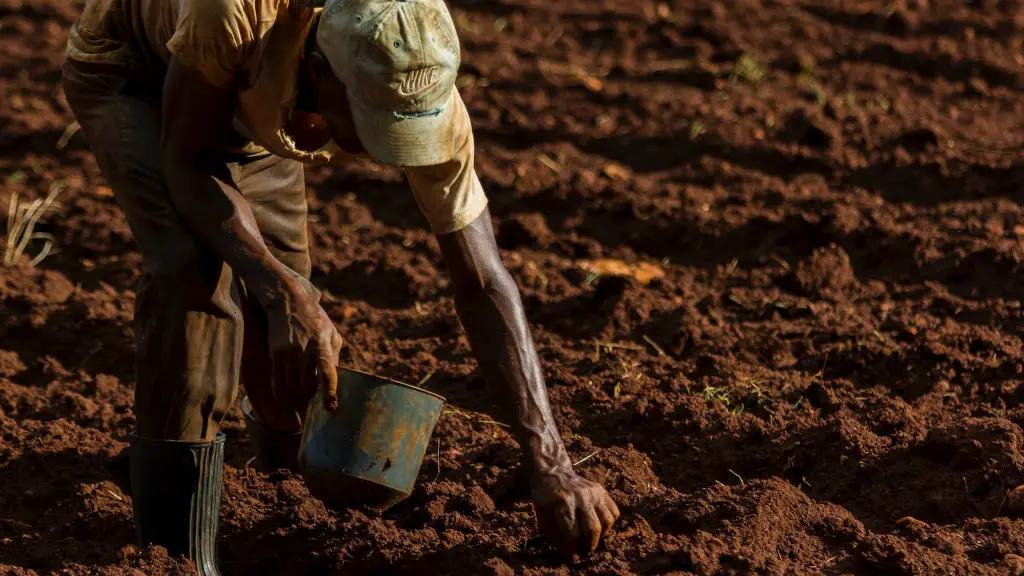Agriculture in Africa developed in response to a variety of environmental and socio-economic factors across time. This includes the availability of productive land, climate and other natural resources, population growth, technological development, regional structure of landrights, or competing uses.
Throughout its history, the African continent has generally been characterized as wayfaring and largely semi-nomadic, so much so that until the nineteenth century, there was very little sedentary or well-developed agricultural activity. But it was during this period, with the establishment of more settled societies, that significant agricultural activity began to emerge. People began to form settlements, refine crop yields and develop methods to support and better protect the land.
As trade networks evolved, new technologies were brought in to central and southern Africa, enabling people to adopt and modify food production, from mixed use to specialized cultivation. Further changes in local and regional government spurred the growth of more complex systems in which wealth and power were increasingly defined by an individual’s access to and control of land and food production. Various systems of sharecropping, cooperatives and land tenure pushed the expansion of commercial farming.
By the twentieth century, local African societies had developed some aspects to their agricultural production, such as dry-land (rain-fed) farming, irrigation, fertilization and seed selection. With the advancement of technology, and the introduction of more advanced farming tools and machinery, greater productivity and diversification of crops, often without the need to bring in laborers, meant that larger numbers of people could become involved, leading to a more specialized mode of agriculture.
The 20th century saw a massive expansion of agricultural production in Africa, with vast improvements made in crop yield, the introduction of even more modern techniques, and the adoption of more efficient methods of land development. Large-scale dam construction and improved methods of water management saw a more consistent supply of irrigation, and sustained production, to the hundreds of millions of people across the continent.
Finally, the availability of credit, new types of markets, higher education, more efficient transportation, and the use of local and global technology and resources on a scale never seen before, have all had an affect in the way agriculture has developed in Africa, creating more prosperous and secure lives for the region’s population.
The role of technology in agriculture development in Africa
As in other regions of the world, technology has played a major role in the agricultural development of Africa. Starting in the mid-20th century, the Global Green Revolution brought new technologies to Africa, including improved crop varieties and higher yields, mechanization and pesticides. This allowed African countries to become signifi-cantly more self-sufficient, while also improving production of cash crops for export. The Global Green Revolution was not without its critics, as eliminating traditional practices and relying too heavily on mono-cropping and petrochemical inputs has led to negative environmental impacts in the region.
More recently, technology has helped to drive a second “Green Revolution” in Africa focused not so much on increasing production, but rather on boosting the efficiency of Africa’s farms and helping them become more profitable. This new revolution utilizes a combination of information technology and mechanization to increase farm productivity, reduce costs, increase access-to-market, and improve farmer education. This new focus on reducing cost, increasing access-to-market, and creating financial sustainability is expected to drive the next decade of African agricultural development.
Examples of tech-driven agricultural innovations are surfacing across the continent: precision farming with satellite imaging technology; mobile-enabled services that help farmers connect to markets and other services; the creation of “agricultural-as-a-service” companies that provide farm management services; and the use of drones for crop monitoring and pest management. These technologies have the potential to help African farmers maximize yields, reduce costs, and ultimately increases their incomes.
At the same time, technologies are being utilized to help farmers store, organize, and utilize data to better manage their farms. Countries like Kenya and Ethiopia, for example, have launched national initiatives to create digital agricultural platforms that provide emerging farmers access to data, services, and market linkages. Further-more, the use of “smart-sensors” and machine learning algorithms is anticipated to lead to more smart and efficient farming practices.
The role of finance in the agricultural development in Africa
Agricultural finance plays a major part in the development of African agriculture. Without adequate funding, African farmers will be unable to buy the inputs they need to increase yield and production. To fund major investments in agricultural technologies, many countries in Africa have depended heavily on subsidies from foreign donors. However, it is increasingly difficult for African governments to secure these subsidies due to competing economic interests and shifting priorities in global development.
In response to this, many countries in Africa are turning their focus to the local and regional capital markets. These types of markets can provide some of the necessary capital to fund sustainable growth and development efforts in agriculture. For example, the African Development Bank has supported the African Local Currency Bond Modalities to increase African countries’ access to local capital within their own currencies. Those investing in these types of bonds are often offered tax incentives and other incentives by the issuing government.
In addition to traditional capital markets, venture capital funds, private investors, and micro-lenders are also looking to invest in African agriculture. For example, in 2018, the World Bank Group’s International Finance Corporation launched a $250 million “African Agriculture Fund” to invest in the commercial agriculture sector in Africa. These types of investments can provide African farmers with access to debt and equity, technology, market linkages, and capacity building.
Furthermore, to increase access to finance for African farmers, a number of technology-driven financial services providers, such as Payoneer, Tala, and Branch International, have emerged to provide African farmers with access to credit lending and other financial services. These types of financial services are designed to provide farmers with more flexible, low-cost financing options.
The role of government policies in agricultural development in Africa
In many cases, the success of African agricultural development depends on the type of government policies and support in place. Often times, policies are necessary to provide a consistent and balanced enabling environment that not only supports the development of large-scale agricultural businesses, but also helps small and medium-sized farmers as well.
In some countries, government policies are geared towards creating policies that reduce barriers of entry and encourage entrepreneurship in the agricultural sector. For example, in Ethiopia incentives have been introduced to stimulate the creation of new businesses and the expansion of existing businesses in the agricultural sector. These incentives include subsidies on inputs, tax exemptions, and the provision of loans to small- and medium-sized enterprises.
In other countries, governments have invested in a variety of programs designed to both increase access to credit, as well as to provide technical training and support to small farmers. For example, the Malawi Smallholder Inputs Subsidy Program provided an estimated 1.3 million smallholder farmers with access to inputs and technical support for the first time. This led to significant yield increases, as well as a doubling of the number of smallholder farmers in the country.
Moreover, to facilitate access to markets, many African countries are both introducing and enforcing laws that protect the interests of small and medium-sized farmers, as well as promote the efficient functioning of markets. In Kenya, the Agricultural Produce Trade and Quality Management Act was introduced in 2008 to regulate agricultural produce trade and ensure quality standards are met.
Finally, to protect environmental and social sustainability, some governments have implemented regulations on the use of land and water resources, as well as agricultural production activities, such as the use of pesticides and artificial fertilizers.
The role of regional and international organizations
International organizations have played a large role in supporting and facilitating agricultural development in Africa. From the implementation of regional and bilateral agreements, to the provision of finance and technical assistance, these organizations have provided support to African countries in their efforts to increase agricultural production and development.
The most prominent international organization in Africa is the African Union. The African Union is a regional body responsible for promoting peace and security, economic development, and agriculture. The African Union has put in place various policies and initiatives to support agriculture in Africa, from formal agricultural recognition to the development of a translocal agricultural policy.
In addition to the African Union, the World Bank, the International Monetary Fund, and other international organizations, are often involved in providing finance and technical assistance to African countries and farmers. For example, the International Fund for Agricultural Development has provided over $3 billion in assistance to smallholder farmers in Africa, while the World Bank has invested over $2 billion in agricultural projects in the continent since the start of the Collaborative African Budget Reform Initiative.
Finally, various non-governmental organizations and civil society organizations have played a critical role in advocating for sustainable and responsible agricultural development in Africa. These organizations often provide local and regional support for agricultural development initiatives, as well as creating and promoting awareness of issues in the agricultural sector.





